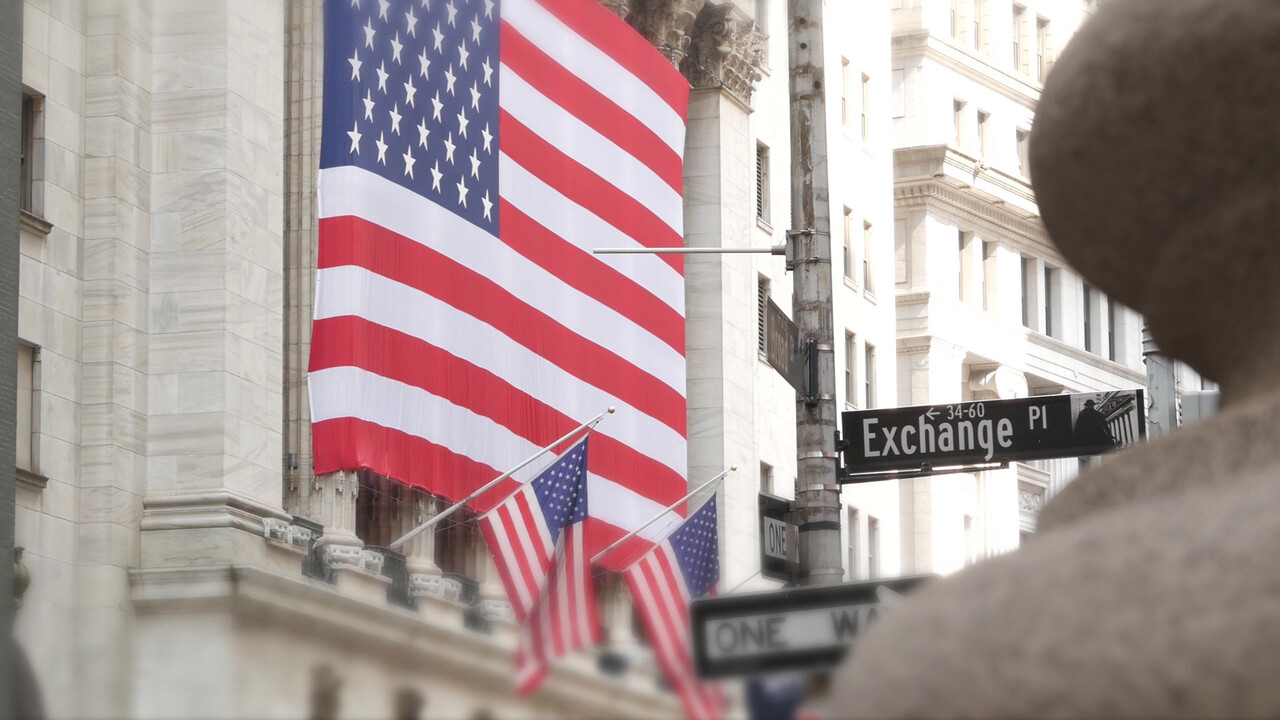Trump’s Tariffs Could Be Good for Bitcoin – But Are Currently Hitting the Market Hard
Trump's tariffs have now been implemented, triggering panic across global stock markets. Bitcoin and other cryptocurrencies are also taking a painful hit. However, there's an interpretation suggesting the tariffs could actually accelerate Bitcoin's rise as a global reserve currency.

Now they are here, the tariffs announced by Donald Trump, and global stock markets have plunged into panic. Bitcoin and other cryptocurrencies are also suffering painful declines. However, there is an interpretation that the tariffs could accelerate Bitcoin’s rise as a global reserve currency.
The value has been dropping in recent days. Bitcoin fell below $80,000, Ethereum even below $1,500, and wherever you look—at Ripple, Solana, Dogecoin—everything is deep red, with prices losing between 10 and 20 percent.

7-day price of Bitcoin according to coinmarketcap.com.
The crypto market as a whole has lost about $300 billion since April 4, and more than $1.2 trillion since the bubble peaked on December 9. The bear market has become unmistakable.

Total market capitalization of all cryptocurrencies according to coinmarketcap.com
A consolation for Bitcoin maximalists is that the Bitcoin dominance index, which is the share of Bitcoin in the total value of the crypto market, has risen to 62 percent, reaching a level not seen since 2020. In some way, the market is becoming healthier; a too low dominance index reliably indicates speculative overheating.

Bitcoin dominance index, also from coinmarketcap.com
Apart from the cryptocurrencies themselves, the stocks of MicroStrategy, Coinbase, and American miners also fell. Furthermore, around $1.36 billion worth of positions such as futures or perpetual swaps were liquidated.
Bitcoin, although relatively stable compared to other cryptocurrencies and securities, suffers in sync with global stock markets. The stock indices DAX, Nikkei, and Dow Jones have plummeted by at least 10 percent in a week, while oil fell to a 3-year low. Only the Euro seems to be gaining—it increases by about 2.5 percent against the dollar—while gold explodes (not silver, platinum, and so forth).
The global economy is in turmoil, and Bitcoin does not play the contrarian role that was originally intended. Gold remains gold, while Bitcoin reacts more like a cyclical security.
Retaliation for Gifts
You know the reason for this icy storm in the markets —Trump’s tariffs, which are currently on the verge of sparking a new trade war.
From a monetary perspective, it is difficult to rationalize Trump’s policy. The USA is in the enviable position of being the only country in the world that can export paper at the price they print on it. Since the dollar is the global reserve currency, effectively the measure of all things, everyone wants to have it to pay for imports or build reserves. This allows the USA to internationalize their seigniorage, the premium for printing money.
So far, this is a win-win situation: global markets have a liquid and universally accepted currency that lubricates foreign trade. In return, the whole world serves the USA as a giant Amazon, where they can shop with the freshly printed dollar notes. This mechanism allows international trade to flourish and makes the USA one of the richest countries in the world.
But Trump is dissatisfied with this. He believes the whole world is taking advantage of the USA because they exchange goods for printed paper notes. The USA has a strong trade deficit with most countries, which is not surprising but the natural and absolutely desirable result of being able to export money. Trump now wants to reduce this imbalance in foreign trade with retaliatory tariffs.
Trump’s apparent goal is to restore the state budget by tariffs and personnel reduction without raising further taxes. He is probably aiming for a situation in which the debt service no longer burdens the budget and the USA can borrow money at favorable conditions. This would strengthen the state’s capacity to act and allow the central bank to stimulate the economy with interest rate cuts without fearing inflation.
„Unknown Territory in the Global Financial System“
The drastic course that is supposed to lead there is at first primarily brutal. According to the Financial Times, the USA faces sharply rising prices for „leather goods, clothing, furniture, and electrical appliances“ in the coming months, for many goods by 30 to 40 percent. While many wholesalers have full stocks, so they will only have to raise prices in a few months, the effect could be faster for food. As early as next month, a surcharge of a good 10 percent for rice and about four percent for vegetables, fruits, and nuts is expected.
This expectation of rising prices also plagues Bitcoin. If people have to pay more for everyday items, they will have less money left to invest in Bitcoin and other cryptocurrencies. Inflation due to too much money is good for Bitcoin, inflation due to too few goods—and this is what tariffs cause—is bad for it.
The tariffs are not just simply inflationary, comments TheStreet. They push consumers and small businesses to their limits. They drive prices for necessary everyday goods, cut profit margins, which are already razor-thin, clog supply chains, and could trigger a trade war, disrupting global goods flows. „Trump’s move is not just a careless negotiation trick. He is playing a game that is bringing the USA to fiscal instability.“ This is also illustrated by interest rates on US government bonds.

Interest on 10-year government bonds according to cnbc.com.
Interest on bonds with a ten-year maturity although fell to a low of four percent at the beginning of April. But in recent days, they have rapidly risen to around 4.46 percent. At least for Tether, Circle and other stablecoin issuers, these are great news, as they mainly cover their coins with government bonds.
An analyst comments in the Financial Times that the rising interest rates are a sign that „the Trump administration might be playing with explosives.“ They indicate that Trump’s destructive actions sabotage confidence in the USA as a stable economic superpower—and possibly also in the dollar itself.
There’s already speculation about whether China, as a kind of warning shot in the tariff dispute, might sell US government bonds. Thanks to its longstanding and massive trade surplus, China holds government bonds worth around $1 to $1.6 trillion. The exact sum is a bit nebulous. Japan’s central bank holds about a trillion dollars in government bonds in its reserves, EU countries together at least $1.5 trillion, and the Asian tiger states Taiwan, Hong Kong, and South Korea another about $700 billion.
If these countries sell only small parts of their government bonds in response to Trump’s tariffs, the USA would be effectively bankrupt, and Trump’s plan would fail. The dollar system has tightly linked the USA with the rest of the world.
The End of the Dollar System?
The only reason why the USA is not already bankrupt is that the dollar is the global reserve currency. Central banks around the world hoard US government bonds without limit, allowing the USA not only to exchange its intrinsically valueless paper for all goods of the world but also to enjoy an endless line of credit. Trump now risks exactly this position in order to reduce the USA’s debts.
Trump sees the USA’s trade deficit as a problem to be fixed. In doing so, he sees the dollar system itself as a problem and accuses other countries of exploiting the USA by using the dollar as a reserve currency.
Until now, central banks have accumulated dollars (and dollar-denominated bonds and stocks) as a result of trade surpluses. When companies export goods, they receive dollars for them but must exchange them for the domestic currency. The central bank ensures liquid foreign exchange markets and buys the dollars from companies. Most central banks retain the dollars flowing to them this way because they provide stable reserves and are needed for imports. Moreover, selling dollar reserves would appreciate their own currency, which would harm exports.
The position of the dollar as a global reserve currency is closely tied to a trade deficit of the USA. Without it, central banks will absorb and hold fewer dollars in the future. They might even have to release dollars from their reserves to supply the import economy with foreign exchange. Should there be such an opening of the floodgates, a gigantic sell-off of American securities threatens. Interest rates on US government bonds would explode—and with them debt.
All this suggests the most worrying consequences for the US economy. An analyst from Deutsche Bank warned that the course of stocks, bonds, and currencies over the past week „points to a simultaneous collapse of the prices of all US assets,“ signifying a step „into unknown territory in the global financial system.“
Is This Good for Bitcoin?
One could interpret all this as the USA giving up its claim to monetary leadership. Trump questions the core of the dollar system when he fights against the USA’s trade deficit. He plays a dangerous game that risks the position of the dollar as the global reserve currency.
Trump’s economic policy could potentially initiate and accelerate the process of de-dollarization that countries like China, Russia, and Brazil have long unsuccessfully hoped for. An uncontrolled trade war could trigger a spiral of devaluation, for instance, if China, as has likely already happened, compensates for the tariffs by devaluing the yuan.
These uncertain prospects could be the interpretation of the crash that is „good for Bitcoin“: if the dollar system is dismantled, a gap arises that Bitcoin could fill as a new reserve currency; if fiat currencies now devalue competitively to enforce trade surpluses, Bitcoin will retain its value; if the economy shrinks and central banks counter with interest rate cuts, Bitcoin will benefit from the liquidity.
The tariffs „bolster the idea of Bitcoin as a complementary asset in a developing global economy,“ writes TheStreet. The markets might currently confirm BlackRock CEO Larry Fink, who warned in January that the dollar is in danger of „losing its status as a reserve currency to digital assets like Bitcoin if the US does not get its debt under control.“ Trump’s tariffs, as TheStreet says, „make this possibility more real and urgent.“ If one has the option to replace a „bloated, debt-driven money system with one where assets are transferable in real-time, borderless, and incorruptible—why wouldn’t you?“
Matthew Sigel, an analyst for VanEck, an asset manager invested in Bitcoin, believes that the tariffs are good for Bitcoin. Trump’s tariff package has newly exacerbated global trade tensions „and threatens to trigger monetary and fiscal fragmentation.“ Although Bitcoin has fallen, it remains relatively stable compared to other securities. If the tariffs limit economic growth, the Fed might respond with monetary policy that has always buoyed Bitcoin; simultaneously, the strategic handling of trade and finance boosts the demand for a neutral instrument for payment settlement.
This is not just theory, Sigel continues. China and Russia have already begun to balance energy trade „with Bitcoin and other digital assets,“ while Bolivia has already announced it will „import energy via crypto starting March,“ and in Europe, the French utility EDF plans to use surpluses to mine Bitcoin. Bitcoin is positioning itself in the global economy, should the dollar fail—and the tariffs make this more likely.
























:quality(80)/p7i.vogel.de/wcms/19/7b/197bd3fb6c052fb1560ba5bd2ad94413/0123842406v2.jpeg?#)
:quality(80)/p7i.vogel.de/wcms/23/0c/230c343b6c53b62b7629278f39952273/0124261848v1.jpeg?#)
,regionOfInterest=(276,144)&hash=5a6b14d303e5232713236e0e5258ac75803925a696b815b20df3e4054413da77#)








































